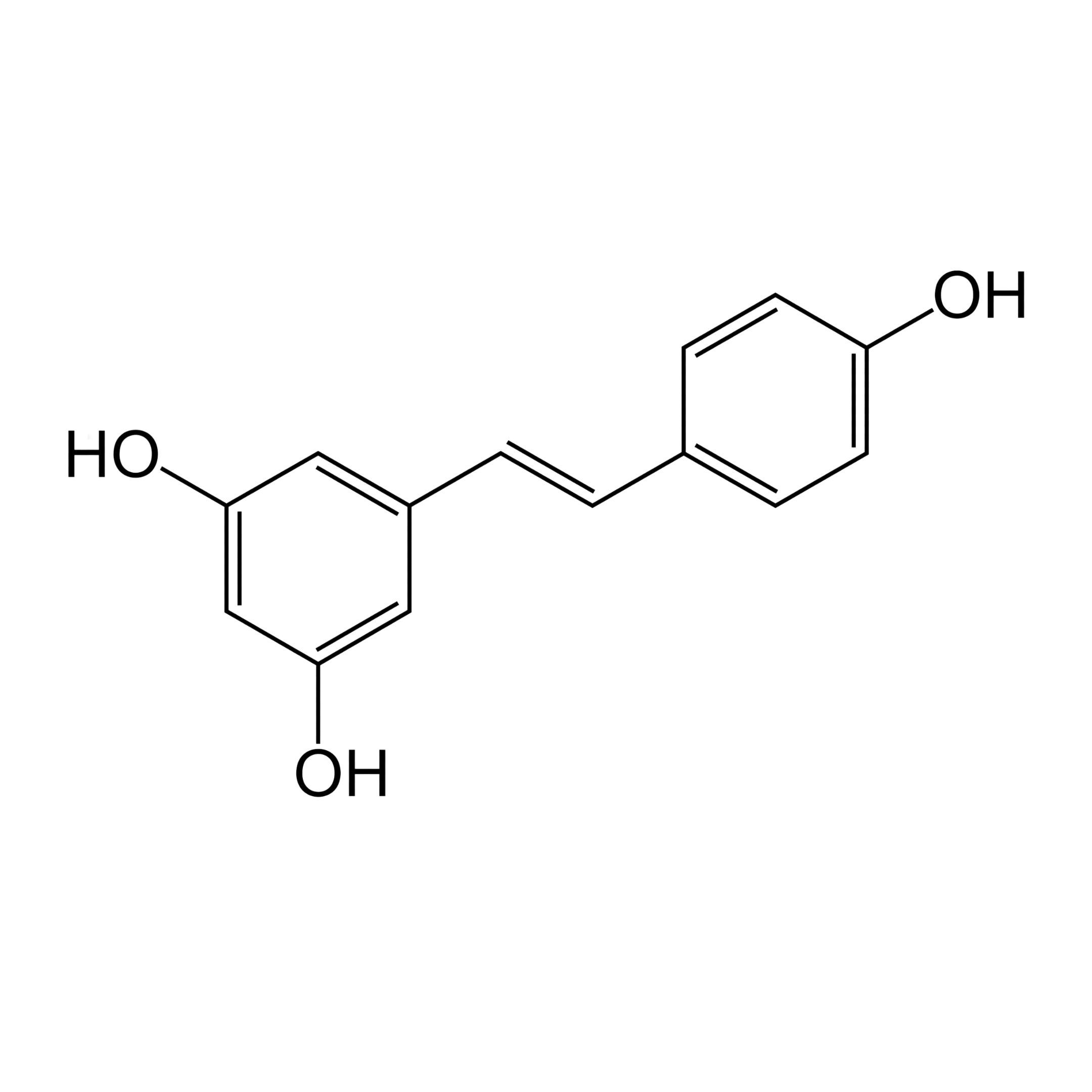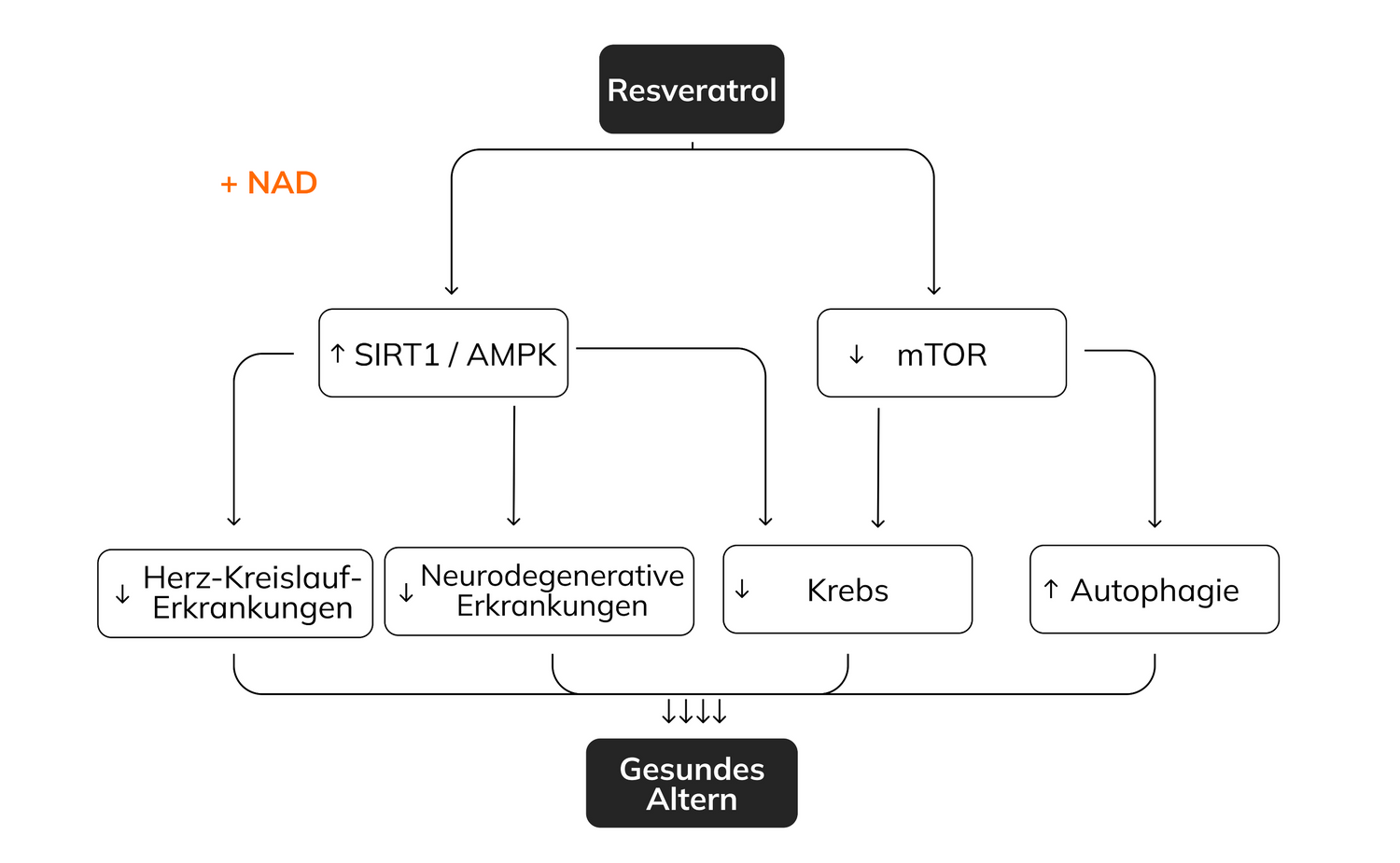Longevity Science
According to current research, resveratrol is a powerful antioxidant that exerts positive effects on cellular health and longevity by activating sirtuins and anti-inflammatory mechanisms, while also counteracting cardiovascular diseases and neurodegenerative processes.
Resveratrol: A natural polyphenol with versatile health benefits
Resveratrol is a naturally occurring polyphenol found primarily in plants such as grapes, berries, and peanuts. It belongs to the stilbene class of compounds and is produced by plants as a defense mechanism against stressors such as injury or fungal infections. Since the early 1990s, resveratrol has been the focus of scientific research because of its association with a variety of health benefits, particularly those related to cardiovascular disease, inflammation, and longevity.

What is Resveratrol?
Resveratrol has the chemical formula C14H12O3 and exists in two forms: trans-resveratrol and cis-resveratrol .
The trans form is considered more stable and bioactive and is the one used in most dietary supplements. Resveratrol is a lipophilic molecule that is soluble in lipid solvents such as ethanol and acetone, but has limited water solubility. This low bioavailability is one of the major challenges in the use of resveratrol as a therapeutic agent, as it is rapidly metabolized and excreted after oral administration.
Resveratrol is found in a variety of plant species, with grapes, particularly their skins and seeds, being the best-known source. Red wine contains higher amounts of resveratrol than white wine due to the fermentation process. Some of the richest natural sources of resveratrol include:
- Grapes (especially red grapes)
- blueberries
- Peanuts
- Japanese knotweed ( Polygonum cuspidatum ), a plant commonly used in dietary supplements
Biological Functions and Mechanisms
Resveratrol has a wide range of biological effects based on several molecular mechanisms . The most important ones include its antioxidant, anti-inflammatory and cell-protective properties.
1. Antioxidant effect
Resveratrol acts as a powerful antioxidant that neutralizes free radicals that cause oxidative stress in cells. Oxidative stress is linked to a variety of chronic diseases such as cancer, cardiovascular disease, and neurodegenerative disorders. By increasing the activity of antioxidant enzymes such as superoxide dismutase and catalase, resveratrol helps reduce cellular damage caused by reactive oxygen species (ROS).
2. Anti-inflammatory properties
Resveratrol inhibits pro-inflammatory signaling pathways such as the NF-κB pathway, which plays a key role in inflammatory responses. By reducing the expression of inflammatory mediators such as TNF-α and interleukin-6 (IL-6), resveratrol can suppress chronic inflammation, which is often associated with conditions such as arthritis, diabetes and cardiovascular disease.
3. Sirtuin activation
One of the most intriguing aspects of resveratrol is its ability to activate sirtuins , particularly SIRT1 , an enzyme linked to longevity and cellular survival. Sirtuins regulate a variety of processes, including energy metabolism, DNA repair, and cellular aging. Resveratrol mimics the effects of calorie restriction, one of the few known interventions that can extend the lifespan of organisms in various models, by promoting the activity of sirtuins.
4. Cardiovascular protection
Resveratrol exhibits a number of beneficial effects on the cardiovascular system, including improving endothelial function and reducing lipid oxidation. Resveratrol has been shown to stimulate the production of nitric oxide (NO) in endothelial cells, which relaxes blood vessels and improves blood flow. This helps lower blood pressure and protects against atherosclerosis. In addition, resveratrol can protect low-density lipoprotein (LDL) from oxidative damage, which is an important factor in the formation of plaques in the arteries.
5. Cancer prevention
In preclinical studies, resveratrol has shown antiproliferative effects on cancer cells. It inhibits cell division and promotes apoptosis (programmed cell death) of tumor cells. Resveratrol can affect several signaling pathways, including the p53 tumor suppressor pathway and the PI3K/AKT/mTOR axis , which are involved in cell proliferation and survival. Animal studies suggest that resveratrol may slow the progression of certain cancers, such as colon and breast cancer.

Promoting longevity and cell health
Resveratrol helps plants fight injury by acting as a stress messenger. It is thought that resveratrol may also act as a stress signal in humans, similar to the physiological stress induced by physical activity or calorie restriction. This type of stress appears to be beneficial, as both exercise and calorie restriction have been shown to have positive effects on longevity. In studies, resveratrol has been shown to extend the lifespan of various organisms, including yeast, worms, and fish. It was also found to reduce the risk of death by 30% in mice fed an unhealthy diet. However, whether resveratrol can produce similar effects in healthy mammals, including humans, remains to be confirmed.
Similar to exercise and calorie restriction, resveratrol activates the enzyme SIRT1 , which has been called the "longevity protein." Resveratrol binds to SIRT1 and increases its sensitivity to NAD+ , thereby increasing the efficiency of NAD+ utilization. This synergistic effect of NAD+ and resveratrol suggests that combined supplementation could potentially provide additive health benefits.
In addition to activating the sirtuin pathway, resveratrol also affects the mTOR (mammalian target of rapamycin) pathway . mTOR is known to inhibit autophagy - a cellular process that is crucial for the degradation and elimination of damaged cellular components. Resveratrol inhibits the activity of mTOR, thereby promoting autophagy. This mechanism plays an important role in the aging process and is central to the prevention of diseases such as cancer.
Synergistic effect of resveratrol and NAD+/NMN
Resveratrol and NAD+ (or its precursor NMN) act synergistically, supporting key cellular processes. Resveratrol activates the enzyme SIRT1 , which relies on NAD+ for its function. This activation promotes the efficiency of NAD+-dependent metabolism, leading to improved cellular repair mechanisms, increased energy production, and a delay in the aging process. Combined supplementation of resveratrol and NAD+ precursors such as NMN may enhance the effects on longevity and cellular health, as both substances play distinct but complementary roles in energy metabolism and DNA repair.

